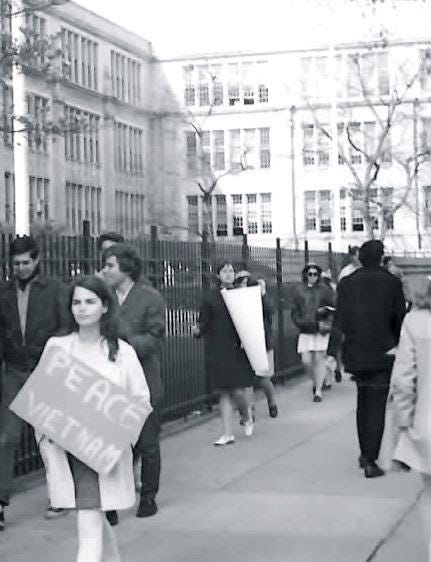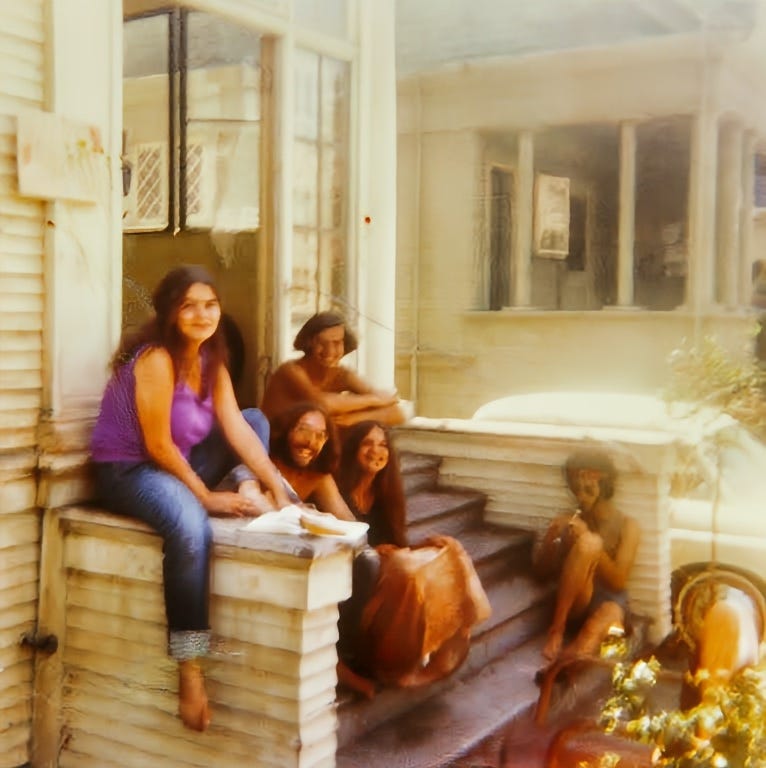“KENT, Ohio, May 4—Four students at Kent State University, two of them women, were shot to death this afternoon by a volley of National Guard gunfire. At least 8 other students were wounded. The burst of gunfire came about 20 minutes after the guardsmen broke up a noon rally on the Commons, a grassy campus gathering spot, by lobbing tear gas at a crowd of about 1,000 young people.”—NYT, 1970

Call me a bookish activist—maybe even an armchair radical. From early on, I gravitated towards books that explored social justice. My first favorites were Karen and The Family Nobody Wanted, followed by Jubilee and The Diary of Anne Frank. At eleven, I planned to walk from house to house (through Brooklyn? America? the World?), explaining why racism, anti-Semitism, and all the other forms of hate were wrong and terrible.
1969: I protested the Vietnam War with a minuscule group at Tilden High School in Brooklyn and saved all my babysitting money to shop for sandals in the Village. (There was only one ‘Village’ to me.)

1970: The shootings at Kent State galvanized us. Barely 18, I participated in the shutdown of City College of New York (I was clueless, simply following whichever guy grabbed my hand.) We joined forces with Columbia University just down the street.
That summer, I crossed the country in a Volkswagen Beetle, took a solo detour to Portland to visit a boy who still had my heart, and reconnected with my friends in Berkeley. My parents couldn’t/didn’t know about these adventures: hitchhiking, crashing with strangers, and wandering the streets of San Francisco.
And more.

By the fall of 1970, I’d returned east and joined a candle-making commune somewhere in Pennsylvania (the smell of patchouli still makes me gag). I learned how to bake bread. When I proudly told my great-grandmother—an immigrant from Romania—about my bread-baking skills, she gave me the side-eye. “You know you can just buy it at the store, right?” she asked, unimpressed.
I didn’t attend enough Grateful Dead concerts to qualify as a true “Deadhead”— just enough to get invited into Jerry Garcia’s van. (I declined. My mother didn’t raise a complete fool.) Few of my adventures from that time will become essays. There’s a reason I write novels and not memoirs.
I scared myself, which might explain why I married at 19. Barely 19.
Marriage in those days involved shopping at a food coop, attending endless meetings, and dreaming of living off the land (though I never quite got there).
I lived on the fringes of what’s happened in my latest novel, The Many Mothers of Ivy Puddingstone (10/29/24)—a “what if” story.
What if I had pursued my youthful dreams of saving the world? What if I’d gone further down that path? And what if it had led me somewhere dangerous?
Researching the novel, which spans the cultural upheavals of 1964 to 2020, stirred up memories of how we lived back then—both as young adults and as the children of that era. It’s about love, politics, and family, told through the lens of a mother and daughter in a political commune and then a ‘children’s commune’ before and after tragedy strikes.
As a companion to The Many Mothers of Ivy Puddingstone, I’m planning a collection called Woodstock Nation—Then and Now (working title—if you have a better suggestion, I’m so waiting). It’ll be published by Brooklyn Girl Books, my alter-ego press, a few months after my novel’s release.
I’m looking for stories, essays, poems, and photographs (many photographs!) from those who lived through the sixties and seventies. If you were part of SNCC, SDS, Young Republicans for Nixon, lived on a commune, started a food coop, tried to be a folksinger or a farmer, or even if your parents just begged you to cut your hair—if you, like me, tried to save the world—I’d love to hear your story and see your pictures.
Interested? Send questions, queries, or submissions to brooklyngirlbooks1@gmail.com.